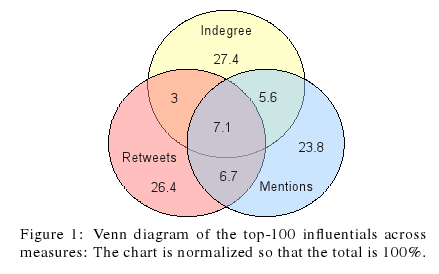A group of researchers have proven something we already expected to be the case: your Twitter follower count is somewhat of a meaningless metric when it comes to determining influence. To reach this conclusion, the researchers examined the Twitter accounts of over 54 million active users, out of some 80 million accounts crawled by their servers. They then went on to measure various statistics about these accounts, including audience size, retweet influence and mention influence. The conclusion? Those with the largest number of followers may be “popular” Twitterers, but that’s not necessarily related to their influence. High follower counts don’t always mean someone is being retweeted or mentioned in any meaningful ways.

The findings from this research project have been published in an research paper available here on the project’s homepage along links to the authors’ profiles:
Meeyoung Cha, Hamed Haddadi, Fabricio Benevenuto, Krishna P. Gummadi.
How the Data Was Analyzed
The data the researchers had access to is astounding: 54,981,152 user accounts, 1,963,263,821 social (follow) links and 1,755,925,520 tweets. In order to collect this massive store of data, the researchers contacted Twitter and asked permission to crawl Twitter’s service. Twitter granted them access and white-listed the IP address range for the 58 servers that were used in the data collection. In total, the crawler was able to scan 80 million Twitter accounts during the month of August 2009. Only 54+ million of those accounts were actually in-use at the time, which, in and of itself, is an interesting finding about how many people create a Twitter account and then abandon it. Only 8% of the active accounts were set to private, so they were ignored during the data analysis. The researchers also used the Twitter API to gather additional information about a user’s social links and tweets.
The study focused on the largest part of the Twitter network – the “single disproportionately large connected component,” notes the paper, that contained 94.8% of users and 99% of all links and tweets. Within that large network of “in-use” accounts, the researchers further narrowed down the data to focus on the “active users.” These users where those who had more than 10 tweets and had a valid screen name that could be retweeted by others. (Interesting – it’s possible to have an account and not a screen name?) That left “only” 6,189,636 active users out of the initial 80 million to examine.
To measure the influence of these 6+ million users, the researchers looked at how the entire set of the 52 million users interacted with these active users.
The Three Measures of Influence
After examining the data, the researchers found that the most followed individuals spanned a wide variety of public figures and news sources and included accounts like CNN, New York Times, Barack Obama, Shaquille O’Neal, Ashton Kutcher, Britney Spears and others. However, the most retweeted users tended to be content aggregation services like TwitterTips, TweetMeme, and, interestingly enough, they counted the tech blog Mashable as an aggregation service, too. Other heavily retweeted users included Guy Kawasaki, the humor site The Onion and again, The New York Times. Meanwhile, those users with the most “mentions” – not a direct retweet including the original content of someone else’s tweet, but just a casual mention of their name – were celebs.
These three measures of influence – followers, retweets and mentions – has surprisingly little overlap when looking at the top influentials. The top 20 lists from these three categories only had two users in common: Ashton Kutcher and Puff Daddy.

The researchers also examined the ability of Twitter users to influence others. They determined that the most influential users hold significant influence over a variety of topics, as opposed to being experts in just one area.
Examining the 233 “All-Time Influentials”
Out of the 6 million active Twitter users, the researchers picked the top 100 users in each of the three categories. Due to the overlap, there were only 233 distinct users on these lists. These were dubbed the “all-time influentials.” Some of these accounts belonged to news organizations or celebs, but others were just regular users. Regarding that last group – it appears that those users who limit their tweets to a single topic are the most likely to increase their influence scores.
In the end, what the researchers found was that follower count alone is not necessarily a worthy measure of determining influence. Other factors come into play as well. Although some heavily-followed accounts are also mentioned and retweeted a lot, just looking at audience size doesn’t reveal an account’s ability to influence and impact the Twitter universe.
According to the project’s homepage, the researchers are hoping to make the data they collected available to the community at large. Before doing so, they will discuss it with Twitter in order to determine that their data sharing plan agrees with the company’s policy. They plan to have an update on this situation – possibly the data itself – by May 2010.









